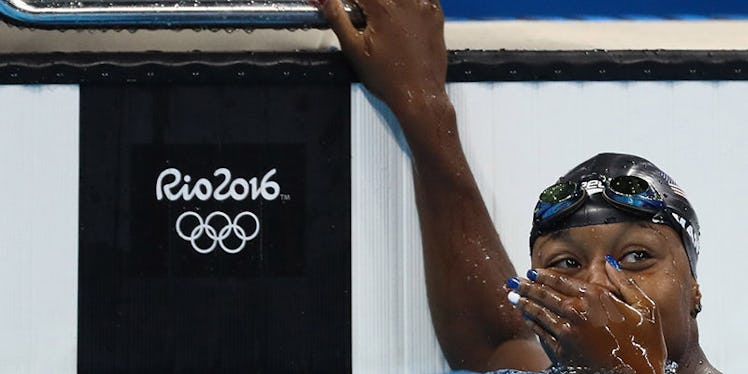
Simone Manuel's Win Is Historic, But There's An Upsetting Truth We Can't Ignore
Simone Manuel's story is missing something.
It's missing something, mostly because those of us doing the storytelling haven't been noting it.
We've all talked about the impact that she will have going forward, and that's true.
As the first African-American woman to win an individual gold medal in a swimming event at the Olympics, Manuel's moment is important for those who will come after her.
But there hasn't been much talk about another group of people, a group she mentioned immediately after winning the 100m freestyle.
This medal is not just about me, it's for a whole bunch of people who came before me.
Manuel's victory in the 100m freestyle isn't important just because she's black.
It's important because of what being black could mean for anyone who has wanted to go to a public swimming pool or, in other words, the people who came before her.
The history is pretty ugly.
In a book that college professor and author Jeff Wiltse wrote, titled "Contested Waters: A Social History of Swimming Pool in America,"the facts are outlined.
First, Wiltse says, pools were segregated along gender and class lines. Then they were segregated along racial lines. And when segregation at public facilities was made illegal by law, the pools still ended up segregated one way or another. That could mean black pool goers getting assaulted or white pool goers abandoning the pools altogether.
The basic argument is easy to grasp: Swimming pools mirror the country's views on discrimination and race.
So in 1953 when famous black actress Dorothy Dandridge dipped her toe in a hotel swimming pool and the hotel's response was to drain the pool completely, as if she was an unclean species, it made perfect sense within the historical context.
And when a white officer was called to respond to a fight at a pool party last summer and ended up handcuffing a teenage girl in a bikini before pulling a gun out on two boys, that also made perfect sense, within the historical context.
As Wiltse wrote in a column for the Washington Post, "Swimming pools have long been contested spaces where Americans express social prejudices that otherwise remain publicly unspoken."
The Guardian's Rose Hackman explains why such discrimination is deadly.
That black children are three times morel likely to die from unintentional drowning while white people are twice as likely to know how to swim as their black counterparts, which she notes, can't be seen a mere coincidence.
But then there's Simone, who just may inspire kids that look like her to go to the swimming pool.
Whether they'll be able to access one and how well they'll be received when they get there, though, has always been the question.